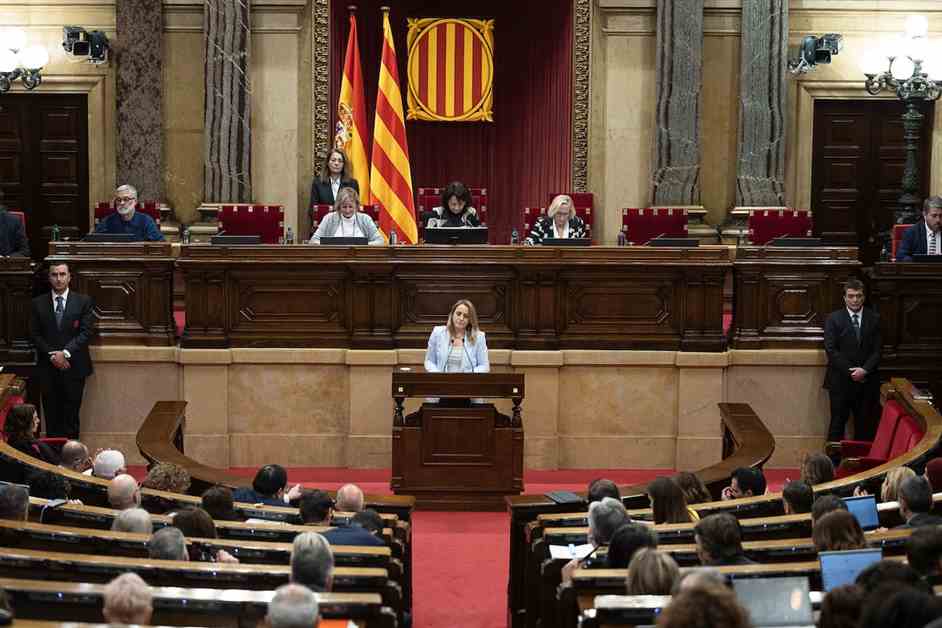El PSC y el independentismo se disputan los seis votos de los Comuns, claves para ganar la Mesa del Parlament
The recent elections to the Parliament on May 12 left a meager loot for the Comuns, but that stumble is now on the rise. Jéssica Albiach, the leader of the party, admitted after the Catalan elections that the result deserved «reflection.» They lost two seats compared to the 2021 polls and are left with six deputies to face the term. A half dozen votes in the Parliament that are of significant importance in the dance of sums to choose who will reach the presidency of the Catalan autonomous Chamber in the next Monday session. The independentist parties have weakened following the Constitutional Court’s decision to annul the online vote that Carles Puigdemont and Lluís Puig may cast. Junts, ERC, and the CUP add up to 57 seats (without the online vote) and are working on a common front to configure what they have dubbed as the «anti-repressive Mesa.» These two votes from the far-right independentist party of Aliança Catalana could be added to this sum, a party they will not negotiate with. A possible agreement between the PSC and the PP provides the support of 57 deputies. The six votes contributed by the Comuns are highly sought after. Everyone is inviting them to sit at their table. The constitutive session of the Parliament is scheduled for next Monday afternoon and voting is done by ballots. Each vote must contain the name of a single deputy. The Constitutional Court ruled on Wednesday that remote voting is not acceptable for «those who have voluntarily decided to evade the action of the Spanish criminal jurisdiction and are subject to an arrest warrant.» This means that the votes of the former president and the former councilor, both Junts deputies who left Spain to avoid being judged, cannot be counted if cast remotely. At the moment, the members of the Age Board, responsible for deciding on these votes, are divided, as reported by Camilo S. Baquero. One of the secretariats will be for Vox – against counting them – and the other for ERC. In X, the former Twitter, the republican Mar Basses, has hinted that she advocates considering them valid. Agustí Colomines (Junts), the President of the Board, declined to comment on what will happen on Monday. Each party can propose its own candidates. To choose the President of the Parliament, an absolute majority is needed, which is a minimum of 68 votes out of 135 seats. If no one achieves it, the vote is repeated between the two names that received the most support. Whoever gets the most votes in this second round, wins the presidency. The result, beyond clarifying who takes the lead of the Board, means being able to take the lead for the subsequent investiture of the President of the Generalitat. A hypothetical progressive agreement between PSC, ERC, and Comuns would add up to 68 votes, but it seems unlikely that the three parties can agree on a consensus candidate. Esquerra advocates for an agreement with the independentist forces, Junts and the CUP, which can add up to a maximum of 57 supports without counting the votes of Puigdemont and Puig. If the messages, especially from Esquerra, to try to attract the Comuns have any result, the alliance would result in 63 votes. It would also have a double effect, as it would mean taking away a potential partner from the PSC. The Comuns have shown interest in a governing body of the Chamber with a «progressive» nature. Jaume Asens, the party’s candidate for the European elections, even supports a possible presidency of ERC. This Board of progressive forces could include the CUP, as advocated by the Comuns, but it must also include the presence of the PSC, a possibility ruled out by Esquerra. The socialists initiated months ago the judicial appeal that overturned remote voting in the Parliament. A maneuver that now complicates their ability to seal an agreement with ERC. The republicans have one of their deputies, Ruben Wagensberg, in Switzerland, to avoid possible legal complications due to the judicial case involving him with the Tsunami Democràtic case. On paper, Wagensberg will be able to vote remotely on Monday because it is noted that he is on sick leave, and in that case, remote voting is accepted. However, ERC highlights that the sick leave will not be eternal and that the party cannot consider an agreement with someone who has «limited» the rights of one of its deputies. The PP has already stated that a priority is to keep the independentists away from the presidency of the Board. The possible sum of PSC and PP provides 57 seats. If the Comuns choose to support this bloc, the count increases to 63, which would be a reissue of the three-way operation that took place in Barcelona City Council a year ago to give the mayoralty to Jaume Collboni and block the path of the independentists. The Catalan PP questions a possible agreement with the PSC if Pedro Sánchez does not break his ties with the independentist parties in Congress first. «What we did in Barcelona was before the amnesty law,» say the Catalan popular party members. «People have voted for the end of the process. It is up to us politicians to confirm it. The PSC will decide if it ends, and we do not like the steps they are taking,» Alejandro Fernández stated on Thursday. On Monday, the Age Board will be in charge of leading the start of the plenary session. It will be led by the most veteran deputy, Agustí Colomines (Junts), and the secretariats will be for the two youngest deputies: Mar Besses (ERC) and Júlia Calvet (Vox). Next, the plenary session will have to elect the President of the Parliament and the six members who accompany him on the Board. The voting system is a sort of puzzle. A first round is used to designate the president, in a second round, the two vice-presidents are chosen, and in the third round, the four secretaries are designated. Subscribe to keep reading. Subscribe to read without limits.





